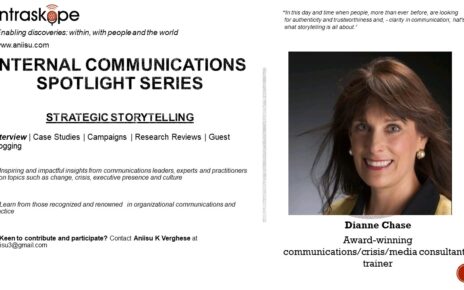Over the years, I have followed research by the Arthur W Page Society and have been impressed by their thought leadership and intent to help organizations and society thrive. Therefore, hearing senior leaders from the Page Society talk about their model for corporate character and authentic advocacy and the role of the Chief Communication Officer (CCO) gave richer meaning to the work they do.
During the course of the day, May 15, the India CCO Dialogue, the 2nd leg of the 3-city tour of India had leaders such as Roger Bolton, Peter Debreceny, Wendi Strong, Eliot Mizrachiand Chris Monteiro share personal and professional perspectives on the evolving world of the CCO. The range of topics included brand and reputation, the global geopolitical ecosystem, culture, societal value creation, digital engagement and communication technology. There seemed to be consensus that now is a ‘great time to be a communicator, but also a challenging time to be one’.
Here are my key take-aways from the event that may be relevant to you:
– From the questions asked by delegates and the conversations that took place, the challenges faced by developing nations like ours were quite similar to issues faced by communication leaders across the world. From getting buy-in, proving business value, getting a seat at the table and changing perceptions, there is not one way to approach the issues on hand. The ‘how’ and ‘why’ of communication contribute to the outcomes CCOs want. The basic expectations of a CCO continue to be that of a strategic adviser and counsel to the CXOs. However, the expectations today and in the future go much broader – to be an ‘integrator’ and a ‘builder’ of digital engagement systems, an advocate of change.

– Taking a data-led, insights-oriented approach has proven to be a key enabler to CCOs getting the attention of leaders. Conversations with leaders will continue to be a lot on business value and value creation. Going in with proof points hinged on reliable and real-time knowledge and the ability to respond to change with strong systems and resources can be an advantage. Investments in communication systems will need partnerships with funding always going to be a constraint. Collaboration is crucial for success and KPIs will become more business oriented.
– To ‘care’ about the world around matters even more corporations and having a communication funnel evolve from the traditional ‘AIDA model’ to the contemporary ‘See-Think-Do-Care’ is a shift we will see more over the years. With millennials indicating their interest to work with organizations that have a social purpose, it is imperative for CCOs to lead the change. The Progression Path articulated by the Page Model for this journey – from Practitioner to Professional and then to Pace Setter, provides insights on how organizations and CCOs can evolve over time. Being a social responsible organization does not mean doing charitable donations and putting out reports. It means aligning with global prioritiessuch as the UN Sustainable Development Goals, standing for local causes and speaking up on policy concerns. Also through integrated reporting and influencing change, the CCO can advance human potential.

– As the day progressed, to me it was evident that what constitutes the role of the CCO is changing dramatically. Just focusing on communication means living in a bubble. Today, the expectation is to be a business enabler and catalyst. It means straddling spaces that were never earlier included in the remit of communication – from collaborating on culture, values, and ethics to risk mitigation, creating social value and curating experiences, the realm of the CCO has significantly widened. Having alignment from staff and other stakeholders and getting agreement with the mission are asks of CCOs. Helping organizations measure their performance and holding up people who model the right behaviors can have catalytic impact.
– CommTech is growing in strength and is picking pace like Marketing Tech (Martech). It is considered a new communication discipline that uses digital tools, techniques and data to draw insights, make better decisions and influence change. With the world coping with ‘fake news’ and ‘deep fakes’ the opportunity to be ahead of the game matters like never before. Moving from mass marketing to targeting individuals based on behaviors and interests aligns to the needs of organizations. Knowing how to use data to understand how that affects stakeholders is of critical importance. Following a journey from beginning to end and moving from output to outcome are key to success. With fragmentation of information, timely decisions can prevent reputational crises and ‘weaponization’ of information.
The future for communication professionals looks bright and exciting. Opportunities abound although having the right capabilities, attitudes, tools and resources are necessary before building a compelling case for organizational transformation and change.
Kudos to Madan Bahal and his AdFactors PR team for organizing a great event. If you attended the event, do share your perspectives using #IndiaCCODialogue for everyone’s benefit.
Read more such articles on my Linkedin page https://www.linkedin.com/in/aniisu/



